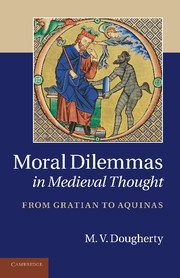Book contents
- Frontmatter
- Contents
- Preface
- Introduction
- 1 Gratian and his glossators on conflicts in the natural law
- 2 Twenty moral dilemmas from two early thirteenth-century summaries of theology: William of Auxerre's Summa aurea and the Franciscan Summa Halesiana
- 3 Raymond Lull and moral ensnarement in the Vita coaetanea
- 4 Thomas Aquinas, moral dilemmas, and a missing article from Quodlibet XII
- 5 Thomas Aquinas on failures of practical reasoning: Why synderesis doesn't inoculate agents against malformed conscience dilemmas
- 6 Moral dilemmas in the early Thomistic tradition: Johannes Capreolus and the Deceiving Demon Dilemma
- Conclusion
- Bibliography
- Index
4 - Thomas Aquinas, moral dilemmas, and a missing article from Quodlibet XII
Published online by Cambridge University Press: 03 May 2011
- Frontmatter
- Contents
- Preface
- Introduction
- 1 Gratian and his glossators on conflicts in the natural law
- 2 Twenty moral dilemmas from two early thirteenth-century summaries of theology: William of Auxerre's Summa aurea and the Franciscan Summa Halesiana
- 3 Raymond Lull and moral ensnarement in the Vita coaetanea
- 4 Thomas Aquinas, moral dilemmas, and a missing article from Quodlibet XII
- 5 Thomas Aquinas on failures of practical reasoning: Why synderesis doesn't inoculate agents against malformed conscience dilemmas
- 6 Moral dilemmas in the early Thomistic tradition: Johannes Capreolus and the Deceiving Demon Dilemma
- Conclusion
- Bibliography
- Index
Summary
A little more than two years before his death, Thomas Aquinas held his final quodlibetal disputation during Lent in 1272. This event was one of the last official duties Aquinas performed as a master of theology during his second regency at the University of Paris, and by all indications it was a lively affair. It took place during a tumultuous period that led to a general strike at the university, but even if it had been conducted during a relatively normal academic period it would still have been an event not to be missed. Quodlibetal disputations were generally interesting, since they were unscripted debates open to the public, overseen by a master of a discipline, with topics for discussion not decided beforehand. Questions concerning anything (de quolibet) could be brought forward by anyone (a quolibet) in attendance. The oral debate would be refined and sometimes put to writing, and the edited version served as the official record of the event. Given the quodlibetal format, the questions were unpredictable and often covered an exceedingly wide range of topics. One historian of the quodlibetal genre has remarked that anyone who was willing to hold a quodlibetal disputation must have had “a presence of mind quite out of the common, and a competency almost universal in scope,” and “many a master refused to risk himself at it.” In the words of a thirteenth-century Dominican witness to such events, quodlibetal disputations were “on anything at anyone's will (de quolibet ad voluntatem cuiuslibet)”.
- Type
- Chapter
- Information
- Moral Dilemmas in Medieval ThoughtFrom Gratian to Aquinas, pp. 112 - 146Publisher: Cambridge University PressPrint publication year: 2011



